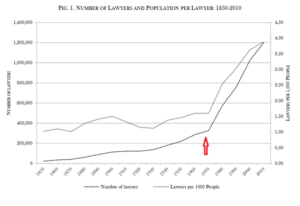Postcards from the florida republic
An independent and profitable state of mind.
“I got the shotgun. You got the briefcase. S'all in the game."
Omar Little to lawyer Maurice Levy, Season 1, The Wire

Yesterday, I asked a question: What is the business model of the government? The malfunctioning corporation in which Americans invest their time, money, and lives, some without even realizing it?
Dare I suggest it’s a partial investment into the world’s largest law firm?
After all, economist Casey Mulligan writes that, since 2021, new regulatory costs stick the average American family with a $5,019 tab every year.
How does that even happen? Where are these expensive regulations coming from?
Lawyers.
Political risk shifted in the 1970s after Nixon took the American economy off the gold standard. We outsourced our manufacturing to Asia, gutted an entire region, and called it the “Rust Belt,” and, at a pen stroke, created a system which pushed our best and brightest students into… banking and law.
The expansion of an American legal class is a pillar of the government’s “business model.” You and I would call it what it is: gridlock.
Thanks, Richard Nixon
 Post-1971, we saw a massive surge, by numbers, in America’s legal class.
Post-1971, we saw a massive surge, by numbers, in America’s legal class.
This has paralyzed the economy, gumming it up with lawsuits and lobbyists.
The country now exists in a state of regulatory perma-gridlock; it's time-consuming, expensive, and, let's be honest, a massive misallocation of resources.
It's also no accident – it's working exactly the way it was intended. It's a business model – a growth one.
The regulatory state is always looking for a reason to expand. But so, too, is the legal industry, a perpetual growth machine that extends its tentacles into nearly every aspect of our lives.
Covid-19 offered plenty of reasons to expand the legal apparatus. The obsession with "ESG" standards is another; it adds more cost and bureaucratic burden to businesses.
For example, we're witnessing the highest regulatory cost to companies since the failed Sarbanes Oxley Act through the new SEC emission tracking requirements.
So, not only must a CFO know how to track fraud properly (and remain on the hook for any problems in the balance sheet), but now they must be experts in defining and recording carbon emissions.
How do they go about doing so?
They must hire a compliance team… comprised largely of lawyers.
It's More than Just Gridlock
There's an even darker side to gridlock and another vital component of the government's business model: graft.
With the rise of the legal class, there's much money in stifling economic growth. Regulations across America are staggering, and everyone creates a reason to go to court. In 2021, Federal agencies alone tallied $201.5 billion in net regulatory costs, according to the American Action Forum (AAF).
Let's look at the obvious ones I've encountered as a consultant. I've worked in consulting largely in real estate, energy, and agriculture.
For example, according to Fannie Mae, 25,000 regulatory bodies in America oversee housing zoning.
And we wonder why there's an affordable housing crisis.
In the U.S., a politician might push for a green energy transition that will require a 1,000% increase in metals and mining in the next decade. Then, two hours later, in a speech down the street, they'll call for new laws that prevent the mining necessary for the transition.
In addition, countless non-profits and "advocacy" groups armed to the teeth with lawyers to stop the production of energy, metals, and even water restoration projects. I wrote just a week ago about the efforts in the Permian Basin, where 40% of U.S. oil exists.
There's good evidence that much of their funding comes from foreign adversaries, but you'll be "character-assassinated" before you even get an investigation off the ground.
But the sue-and-settle business model hammering our natural resource sector, housing and industrial development, and even our military security is the worst scam going today.
One of the greatest lines in television history comes from Frank Sobotka in Season 2 of The Wire: "We used to make shit in this country," he says. "Now we just reach into one another's pocket."
I'll Lose A Few Friends Over This
Some of the smartest people I know today are lawyers – and I can't fault some of my friends for following the job's incentives, pay, and influence. This is the system we were born into.
But 60 years ago, they would likely have found better incentives to build bridges, plan cities, start large manufacturing centers, and create real things that produce tangible value.
There's a tragedy because some were among the top 2% of all MBA or engineering students of the last 25 years – and the system's incentives called them to law.
I can't imagine they're happy with me just now.
But what infuriates me is that in the conversations I've had with sitting U.S. Congresspersons and Senators, six in total – all lawyers. All of them have agreed with me on gridlock and graft.
But they have not stood before their colleagues and pointed out the problem on their Chambers' floors.
Their silence is great news for the Great American Business Model.
Of course, I can't leave the entire business model on the heads of lawyers.
There's plenty of bureaucrats as well. So, as we talk about the next part of the business model, we'll leave no stone unturned.
We’ll continue tomorrow.
Stay positive,
 Garrett Baldwin
Garrett Baldwin
Secretary of Finance
The Florida Republic
About the Author
Garrett Baldwin is a globally recognized research economist, financial writer, consultant, and political risk analyst with decades of trading experience and degrees in economics, cybersecurity, and business from Johns Hopkins, Purdue, Indiana University, and Northwestern.



